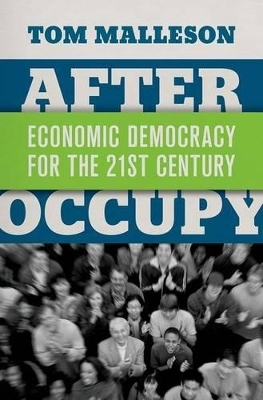
After Occupy
Oxford University Press Inc (Verlag)
978-0-19-933010-2 (ISBN)
These days, it is easy to be cynical about democracy. Even though there are more democratic societies now (119 and counting) than ever before, skeptics can point to low turnouts in national elections, the degree to which money corrupts the process, and the difficulties of mass participation in complex systems as just a few reasons the system is flawed. The Occupy movement in 2011 proved that there is an emphatic dissatisfaction with the current state of affairs, particularly with the economy, but, ultimately, it failed to produce any coherent vision for social change. So what should progressives be working toward? What should the economic vision be for the 21st century?
After Occupy boldly argues that democracy should not just be a feature of political institutions, but of economic institutions as well. In fact, despite the importance of the economy in democratic societies, there is very little about it that is democratic. Questioning whether the lack of democracy in the economy might be unjust, Tom Malleson scrutinizes workplaces, the market, and financial and investment institutions to consider the pros and cons of democratizing each. He considers examples of successful efforts toward economic democracy enacted across the globe, from worker cooperatives in Spain to credit unions and participatory budgeting measures in Brazil and questions the feasibility of expanding each. The book offers the first comprehensive and radical vision for democracy in the economy, but it is far from utopian. Ultimately, After Occupy offers possibility, demonstrating in a remarkably tangible way that when political democracy evolves to include economic democracy, our societies will have a chance of meaningful equality for all.
Tom Malleson is a Social Sciences and Humanities Research Council (SSHRC) Postdoctoral Research Fellow at York University, Canada. He is the co-editor of Whose Streets? The Toronto G20 and the Challenges of Summit Protest (Between the Lines, 2011) and the author of Stand Up Against Capitalism (Between the Lines and New Internationalist, 2014).
Acknowledgements ; Part One: Introduction ; 1. Introduction ; 2. Economic Democracy: Beginning Orientations ; Part Two: Workplaces ; 3. Should Workplaces be Democratized? ; 4. Worker Cooperatives in Practice ; Part Three: The Market System ; 5. Democracy and the Market System ; 6. Democratizing the Market System ; Part Four: Finance and Investment ; 7. Should Finance and Investment be Democratized? ; 8. Finance and Investment Democracy in Practice: Capital Controls, Public Banks, and Participatory Budgeting ; Part Five: Conclusion ; 9. Towards a Feasible Socialism for the 21st Century ; Bibliography
| Zusatzinfo | 2 b/w line |
|---|---|
| Verlagsort | New York |
| Sprache | englisch |
| Maße | 165 x 236 mm |
| Gewicht | 558 g |
| Themenwelt | Sozialwissenschaften ► Politik / Verwaltung ► Politische Systeme |
| Sozialwissenschaften ► Politik / Verwaltung ► Politische Theorie | |
| Wirtschaft ► Volkswirtschaftslehre ► Wirtschaftspolitik | |
| ISBN-10 | 0-19-933010-7 / 0199330107 |
| ISBN-13 | 978-0-19-933010-2 / 9780199330102 |
| Zustand | Neuware |
| Haben Sie eine Frage zum Produkt? |
aus dem Bereich


